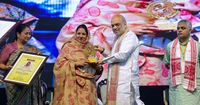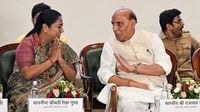New Delhi: Union Home Minister Amit Shah, addressing the closing ceremony of the 1008 Sanskrit Sambhashan Shivirs in New Delhi on Sunday, described Sanskrit as the "mother of nearly all Indian languages" and said its promotion is closely tied to the country’s broader cultural and educational agenda. Shah asserted that Sanskrit is among the most scientifically structured languages, a view also held by many linguistic scholars globally. He claimed that its revival would have a cascading positive impact on other Indian languages and dialects.
The event was organised by Sanskrit Bharati, an organisation working since 1981 to promote spoken Sanskrit. Shah commended the initiative for its scale, claiming that over one crore individuals have been introduced to Sanskrit conversation, with thousands of teachers and entire families now using Sanskrit as their primary language in certain parts of India. He further stated that the decline of Sanskrit predates colonialism and called for long-term efforts for its revival.
Shah mentioned that under the current central government, various programmes have been initiated to support Sanskrit’s growth. These include: the ‘Ashtadashi’ scheme covering 18 projects for Sanskrit development; central support for the publication and reprinting of rare texts; increased honorariums for recognised Sanskrit scholars; and the elevation of Rashtriya Sanskrit Sansthan to Central Sanskrit University status.
He also referred to the Gyan Bharatam Mission, which has a corpus of ₹500 crore aimed at collecting, preserving, and digitising Sanskrit and Prakrit manuscripts. According to data shared, over 52 lakh manuscripts have been documented, 3.5 lakh digitised, and 1.37 lakh made publicly available through the namami.gov.in portal.
The home minister cited the new National Education Policy (NEP) as placing strong emphasis on India’s traditional knowledge systems, including Sanskrit. He also referenced the ‘Sahasra Chudamani Yojana’, under which retired Sanskrit scholars are being appointed as educators. Shah argued that Sanskrit holds key insights across disciplines such as medicine, mathematics, astronomy, and philosophy, and that preserving these manuscripts is essential for knowledge transmission.
However, independent scholars and linguists have long debated claims regarding Sanskrit’s primacy or exclusivity as a root language for all Indian tongues, noting the influence of other language families like Dravidian and Austroasiatic. According to organisers, Sanskrit Bharati now operates in 26 countries with 4,500 centres and has conducted the World Sanskrit Book Fair in 2011.
Delhi Chief Minister Rekha Gupta was also present at the event and claimed that Sanskrit is a ‘scientific’ language, asserting that even NASA has acknowledged it as such. Gupta made the remark addressing the closing ceremony of a 10-day Sanskrit learning initiative in New Delhi on May 4. "Even NASA scientists have written papers on Sanskrit and have confirmed that it is a scientific language. Coding can be done in Sanskrit. Sanskrit is the most computer-friendly language," Gupta was quoted as saying by news agency PTI.
Gupta's assertion was likely based on a 1985 paper published in AI Magazine. The paper, titled ‘Knowledge Representation in Sanskrit and Artificial Intelligence’, was authored by Rick Briggs, a researcher associated with NASA Ames Research Centre, who sought to prove that a "natural language can serve as an artificial language also." Briggs, about whom little else is known, cited in the paper ancient Sanskrit grammarians who "accomplished" a method for "paraphrasing Sanskrit in a manner that is identical not only in essence but in form with current work in Artificial Intelligence."
At the event on May 4, Chief Minister Gupta said that a societal bias viewed fluency in foreign languages as a sign of intelligence, while often dismissing Sanskrit. "If our children speak French, German or English fluently, then we consider that child very bright and take pride in that. But when a child can speak Sanskrit with the same fluency, it is not considered a big deal," she said.
Gupta argued that Sanskrit is not only foundational to Indian culture but also integral to many Indian languages. "Every state has a mother tongue, but in reality, Sanskrit is our mother tongue as every language has descended from Sanskrit. Hindi, Marathi, Bengali, Sindhi, Malayalam -- these are all branches of Sanskrit," she said.
The Delhi government, in collaboration with the NGO Samskrita Bharati, conducted free Sanskrit classes from April 23 at 1,008 locations across the city schools, colleges, and temples, with daily two-hour sessions focusing on the basics of the language. Gupta said such efforts are part of a broader push to restore Sanskrit's place in everyday life and education.
Shah also remarked that the Modi government is giving new life to the ancient languages of the country by connecting them with modern technology and lifestyle. He emphasised that no one can be separated from their mother tongue, and that Sanskrit is the mother of nearly all Indian languages. The promotion of Sanskrit, he noted, is not merely about reviving an ancient language, but also about advancing the nation’s comprehensive progress.
In conclusion, the recent emphasis on Sanskrit by the Indian government and local leaders indicates a significant cultural shift aimed at reviving an ancient language and integrating it into modern education and society. As discussions around the language intensify, the impact on India's linguistic landscape remains to be seen.





